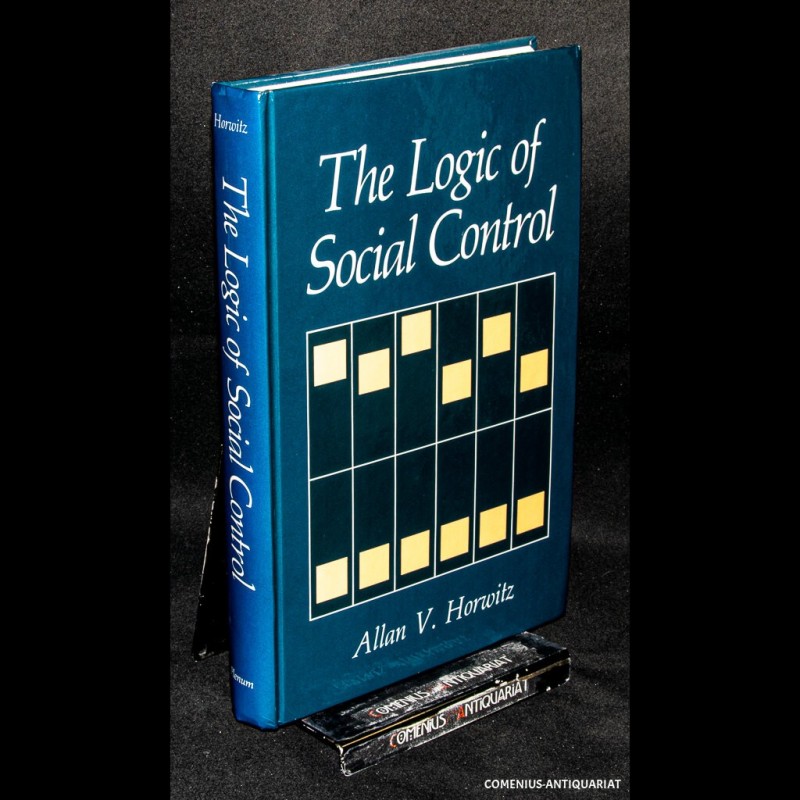Horwitz, Allan V.,
The Logic of Social Control. New York: Plenum Press, 1990. xv, 290 Seiten mit Literaturverzeichnis und Register. Pappband (gebunden). Grossoktav. 235 x 157 mm.
* Leicht bestossen, kleiner Stempel auf dem Vorsatzblatt..
Bestell-Nr.158440 | ISBN: 0-306-43475-X
Horwitz |
Psychologie |
Psychology |
Soziologie |
Sociology
Foreword
Historians of the future might justifiably call our century the "Century of Science." Most scientific knowledge has come into being since 1900, and most of the scientists who have ever lived are presently alive. While our understanding of old problems everywhere expands, we continually identify new problems for investigation and broaden the jurisdiction of science. Social science is thus largely a twentiethcentury invention, and even scientific behavior itself is a subject of scientific inquiry. We have learned, for example, that scientific knowledge advances primarily through the establishment of what Thomas Kuhn calls "paradigms"—frameworks that identify problems for research, organize findings, and guide the elaboration of theory. We have also learned that scientific ideas, including the paradigms themselves, do not arise and proliferate by logic alone but rather by what another student of science, Derek de Solla Price, calls "invisible colleges"—social networks of scientists who participate jointly in building a common body of knowledge. The Logic of Social Control, by Allan V. Horwitz, beautifully illustrates the nature of scientific progress. Indeed, it is a model of modern sociology. The investigation of social control—how people define and respond to deviant behavior—began at the turn of the century and has continued at a steadily increasing rate across a broadening range of phenomena. First came inquiries into the evolution of law—one of the most sophisticated and controversial forms of social control in modern societies. Anthropologists discovered, however, that simpler societies often handle deviant behavior entirely without governmental institutions such as the police, courts, or legislatures, in fact, without government or law at all. Now we also recognize that even in the most complex and differentiated societies of the modern world, legal activity constitutes only a small fraction of the social control in everyday life. All settings—whether families, organizations, occupations, neighborhoods, friendships, or gatherings of strangers—have their own forms of social control. It includes everything from rebukes to homicides, avoidance and exclusion, gossip, negotiation, and various modes of thirdparty intervention such as mediation, psychotherapy, and adjudication. Social control mirrors the diversity of social life itself. A number of sociologists have explored this diversity across the social universe, past and present, seeking always to discover precisely how social control varies with its location and direction in social space. Professor Horwitz, a leading figure in this movement, previously devoted most of his attention to the handling of deviant personalities (those known as insane) and wrote what may be the most important published work an that subject: The Social Control of Mental Illness (New York: Academic Press, 1982). But the present volume reaches far beyond his previous work. The Logic of Soda! Control is the most comprehensive study of social control ever written. It offers at once a statement of the paradigm guiding the field, an inventory of existing knowledge, and a wide array of new formulations extending the theoretical frontiers of the field. The book is truly breathtaking in its ambition and scope, and will provide a starting point for empirical and theoretical studies of social control for many years to come. Moreover, with the publication of The Logic of Social Control, a major field of social science comes of age. The sociology of social control may now be regarded as one of the scientific accomplishments of the twentieth century.
DONALD BLACK
Charlottesville, Virginia






 frais de transport
frais de transport
 Google Mail
Google Mail
